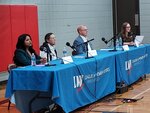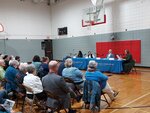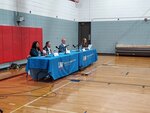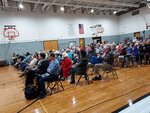



Ward 12 city council candidates shared viewpoints with over 200 people at a forum held Sept. 12, 2023. Candidates there included Aurin Chowdhury, Nancy Ford, and Luther Ranheim who are campaigning to fill the seat currently held by Andrew Johnson who is not seeking reelection.
The forum was sponsored by the League of Woman Voters, and held at Longfellow Recreation Center.
Ford, 64, is an 18-year Ward 12 resident. She owns a small business in the ward, The Repair Lair, that recently moved from East Lake St. to Minnehaha Ave. She lives in the Ericsson neighborhood, has run for city council in the past, and served on the board of the East Lake Special Services District.
Ranheim, 49, grew up in the Nokomis neighborhood, and graduated from South High School. He currently lives in Howe and has worked fundraising for MacPhail Center for Music, Greater Twin Cities United Way, the Minnesota Orchestra, the Alzheimer’s Association and, most recently, as a “Gift Planner” with the St. Paul and Minneapolis Foundation.
Chowdhury, 26, is a first-generation Bengali-American, organizer, and renter. She grew up on the Southside and went to Minneapolis Public Schools. She has worked on public policy at the office of Senator Kari Dziedzic, and now as a Ward 9 city council policy aide.
Chowdhury, Ford and Ranheim all sought the DFL endorsement which went to Chowdhury earlier this year.
VIEWS ON HOUSING AND ENCAMPMENTS
Whitney Larson moderated the forum, which included several questions related to housing.
“One of the biggest issues I hear residents talk about is housing,” said Ford. “We need to build more purchasable property, and we need to look at the obstacles that are keeping people from being able to purchase their own property.”
“We need to make sure that we’re providing the housing to meet the needs of everyone,” said Ranheim, calling for investments in naturally occurring affordable housing, like “mom and pop” landlords. “We need to invest significantly in public housing because right now there is a 4 year wait to get into public housing and that is unacceptable.” He also noted that “we have to acknowledge the shameful history of our city with racial redlining and racial deed covenants.”
“Right now we are living in two Minneapolises,” said Chowdhury. “We have to understand that as Ward 12 residents it’s our responsibility to stand with parts of the city that are getting inequitable resources and part of that is housing. Housing is safety. Housing is building economic wealth. Housing is what is going to make some people stay in the city of Minneapolis.”
They agreed that the current approach to encampments needs to change.
“What we are doing right now is not working,” said Chowdhury, calling for “a standard operating procedure for how we have just transitions of people from encampments.”
“Our cat and mouse game right now is not working,” said Ranheim, who stressed the need for a “housing first model.” He added, “We need an Avivo village on the southside.”
Ford talked about seeing first-hand the conditions of the encampments and is “100% against them.” She added, “We need to build more low- and no-barrier housing with wrap around services to help support residents in those properties.”
DIFFERENCES on rent control
Differences on regulating rent increases were evident.
“I’m 100% against rent control,” said Ford. “It will have a negative impact on both the quality and quantity of housing.”
“I think rent control will do more harm than good,” said Ranheim, saying he opposed it and citing the St. Paul ordinance as a failed effort. If elected, he said that because of the rent stabilization ballot item approved in 2021, “I would start by bringing together renters, mom-and-pop landlords and the builders of housing, and come up with a solution that would meet the needs of all stakeholders.”
“I have been very consistent with my position on rent stabilization. We do not need to have the St. Paul policy here,” said Chowdhury. “We can make reasonable limits on rent. There are over 182 municipalities that have some form of rent stabilization,” she added, noting that she would work develop a compromise proposal that could address concerns and problems of displacement related to rising costs of rents in the city.
PUBLIC SAFETY IS A CONCERN
The candidates agreed that public safety was also an important issue.
“I believe that currently the biggest challenge facing our city is public safety,” said Ranheim. “We need to create a holistic public safety program for our community that meets the needs of our entire community.” He said that he thinks police are understaffed, is concerned about response times, and supports alternative responses.
“We are divided on public safety,” said Chowdhury, who said she would focus on the police contract that is now being negotiated to “make it strong and management accountable,” as well as on having a meaningful “truth and reconciliation process.” She indicated that she supported adding officers to comply with a charter requirement.
“Not all police are horrible,” said Ford. “We definitely need them in the ward.”
They agreed that a police station should not be relocated on Lake St. at 3000 Minnehaha, but supported having a station or stations in the area.
“It doesn’t need to be there, and it probably shouldn’t go back there,” Ford said about the previous location. “We still need something in the ward.”
“I would advocate for getting a police presence back in the 3rd Precinct geography as soon as possible,” said Ranheim. “One thing I would put forward is that we test and pilot public safety satellite hubs across the Ward 12 geography and see how it works.”
Chowdhury said that there are “two needed conversations” related to police in the area. One would be about truth and reconciliation, and the other would be about where to have a “centrally located police precinct that looks completely different” with “comprehensive services and resources” and “a place violence interrupters could be based out of.”
She also said that she would make sure the Lake Street safety center would reopen, and that “we can have multiple spots in the ward for more safety centers.”
IDEAS ON CLIMATE EQUITY PLAN FUNDING
There were differing opinions about funding the recently approved Minneapolis Climate Equity Plan.
“Climate change is the battle of our generation,” said Chowdhury. “I am really happy the people’s climate and equity plan passed,” she said before proposing that the shareholders of the utility companies themselves help fund the plan’s implementation.
“We definitely do not have enough funding to address all the issues that are in our climate equity plan,” said Ford, who suggested using a sales tax for the funding.
“We need to do everything at our city with a climate lens, and make the significant investment needed to help our city be more climate resilient,” said Ranheim. He proposed using all of the roughly $40 million in franchise fee funds that are now being used to fund a variety of city programs and services. “I suggest we sequester these franchise fees and entirely dedicate them to implement the People’s Climate Equity Plan,” said Ranheim. He said that $40-50 million “is a good start, but it is going to take even more than that in the coming years. Five to 10 years out, we should be spending $75-100 million.”
BUSINESS SUPPORT
Support of businesses, especially on East Lake St., also came up several times in the forum.
Ford called for swifter action dealing with vacant and abandoned property. “It has a huge negative impact on all the adjacent businesses,” she said.
Ranheim wants to look at preserving parking and improving the “regulatory environment” where “sometimes the city gets in the way.”
Minnehaha Ave. should be formally designated by the city as a “Cultural Corridor that would bring in additional resources,” said Chowdhury. She also advocated easing restrictions on street festivals, and thinks that businesses should be consulted more and committed to meeting with them regularly. “Too often the city creates an idea and doesn’t come to businesses first.”
Ford said that, among other things, the city needs to “expedite the licensing and inspection processes.”
SIDEWALK SNOW CLEARING
Differences were evident when the candidates were asked about sidewalk snow clearing. Earlier this year, the city council received a report about sidewalk snow clearance that included an estimate of $40 million for clearing all the city sidewalks, as well as an outline of other potential less costly programs including senior snow clearing, snow ambassadors, snow case workers, and mobile teams.
Ford and Ranheim focused on the full city option.
“The thought of spending tax dollars to shovel the whole city makes no sense to me whatsoever,” said Ford, “I am against it 100%.”
“If we were to institute public shoveling at a cost of $40 million a year that would be a bad use of your taxpayer dollars,” said Ranheim, who preferred targeted enforcement and non-city funded solutions instead.
Chowdhury suggested looking for middle ground. “We are having a conversation where people with disabilities and seniors are not having their sidewalks shoveled,” she said. “I agree $40 million a year for all the sidewalks isn’t a good spend, but we can figure out ways to target approaches to help people most in need.”
EXPERIENCE AND LEADERSHIP STYLES
Voters may rely as much on differences in experience and leadership styles as on policy positions when deciding who to vote for.
“I come from this community,” Ranheim said. “I’m seeking to serve this community because of a deep love for this community. Together we all deserve a safe and equitable Minneapolis.”
“I don’t bring a political agenda to the table. I don’t have a particular ideology. What drives me are the needs and desires of every single person who lives in this ward,” said Ford. “The perspective I bring to the table is very different from what most candidates who typically run for office bring, and that is the perspective of a small business owner and the pragmatism that comes along with that.”
“The trouble we have as a city is coming together on a vision where we have unity.” Chowdhury said. “For me what this is about is building a multi-generational, multi-racial coalition so we can have safe healthy communities. I have a proven record of getting things done at city hall, and that’s what I’m bringing to the table.”
The city council election will be on Nov. 7 and early voting is already underway. For more information and to learn how to vote visit https://vote.minneapolismn.gov/voters/ and www.VOTE411.org
“Please vote,” said Lason, “your vote matters.”
Comments
No comments on this item Please log in to comment by clicking here